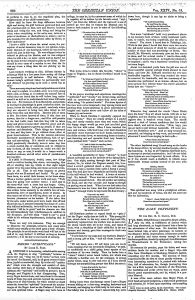The spiritual is a genre in American music that has occupied a key cultural and musical role in the landscape of American music. But the tradition to which it belongs is somewhat ambiguous; it seems to have roots in both the folk song, and art song traditions. How you choose to define it depends both on the context of performance and the agenda of the definer. One of the texts I looked at was the analysis of an author of the highly conservative Christian Union Journal in 1881.

Lillie, E. (1881, Sep 28). NEGRO “SPIRITUALS.”. Christian Union (1870-1893), 24, 292. Retrieved from https://www.proquest.com/magazines/negro-spirituals/docview/136705508/se-2
In the text Barr asserts that not only is the spiritual not a learned tradition, but that the continued education of emancipated African Americans will drive spirituals into extinction1. Barr goes so far as to assert that spirituals are a folk tradition incompatible with a learned audience. Barr’s analysis clearly works to uphold white supremacy in the context of church music, because while there’s acknowledgment of the moving, strong, emotional power of spirituals, they’re framed in a primitivist, othering framework.
In reality, spirituals had developed the sophistication to move into the Art Song tradition2, rebutting the analysis of scholars like Barr who would posit that its only utility came from its raw simplicity. One famous group of settings by William Dawson is clearly indicative of this; the arrangements make use of spiritual tunes blended with contemporary compositional techniques to create innovative polyphonic harmonies, forming a new genre known as “concert spirituals”. These concert spirituals led to wide-spread legitimizing of the spirituals in music performance, leading to their programming by choirs around the country (including the St. Olaf Choir linked below).
Ezekiel Saw de Wheel. YouTube. YouTube, 2020. https://www.youtube.com/watch?v=CHsKUjxOTz4.
This definition can also be frought though, as it has in many cases led to discussions of “for whom are spirituals appropriate?” The definition of spirituals as an art song has, in the eyes of some scholars, stripped them of their cultural meaning and significance. Poet Langston Hughes believed spirituals, “When they are sung purely for entertainment…then a little minor crime is committed”.3
Contemporary scholarship has found a way to acknowledge the value of spirituals both in their folk and art song forms4. Music theory and musical academia has become more accustomed to legitimizing music traditions outside of the Western tradition and scholars such as Solomon Omo-Osagie have looked towards some of the emotional and social power of spirituals beyond just their value as musical creations (a power which, to their credit, even scholars in 1881 seemed aware of). The case of spirituals in the United States is a telling example in the power of classification and definition, and gaining legitimacy within the American musical canon.
1 Lillie, E. (1881, Sep 28). NEGRO “SPIRITUALS.”. Christian Union (1870-1893), 24, 292. Retrieved from https://www.proquest.com/magazines/negro-spirituals/docview/136705508/se-2
2 Stone,Jeffrey Carroll,,II. 2017. A legacy of hope in the concert spirituals of robert nathaniel dett (1882-1943) and william levi dawson (1899-1990). Ph.D. diss., North Dakota State University, https://www.proquest.com/dissertations-theses/legacy-hope-concert-spirituals-robert-nathaniel/docview/1952703510/se-2 (accessed September 21, 2023).
3 Hughes, LANGSTON. 1956. Concerning the singing of spirituals today. The Chicago Defender (National edition) (1921-1967), Jan 28, 1956. https://www.proquest.com/historical-newspapers/concerning-singing-spirituals-today/docview/492900224/se-2 (accessed September 21, 2023).
4 Omo-Osagie, S. (2007). “Their souls made them whole”: Negro spirituals and lessons in healing and atonement. Western Journal of Black Studies, 31(2), 34-41. Retrieved from https://www.proquest.com/scholarly-journals/their-souls-made-them-whole-negro-spirituals/docview/200339335/se-2
